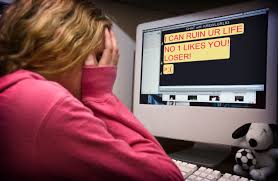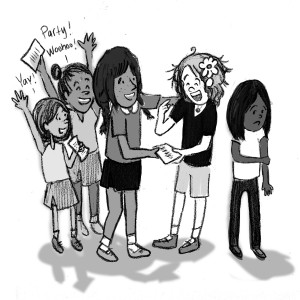|
|
May 13, 2015
by Amy Williams
Amy Williams is a journalist based in Southern California. Mom of two, she uses her parenting experience to help other parents raise their children to be the best that they can be. You can follow Amy on Twitter and Facebook.
 Why don’t they leave me alone?! According to Chinese tradition 2015 is the year of the Sheep. I hope it’s better than last year, which I called The Year Of The Bully.
At the start of 6th grade our son had a physical altercation at football practice. The harassment continued at school, extracurricular events, and on Social Media. We didn’t know because our son didn’t let us in on it, a typical response from tweens and teens who are being targeted.
He’d come home from practice upset, shirt torn, and occasionally with missing his cleats. At first we chalked it up to the rough nature of the game and forgetfulness. But other things indicated something was wrong. Some of the puzzle pieces we observed:
- Our son frequently complained about stomach aches and found it difficult to sleep at night.
- He was visibly upset and often would erupt in anger toward his younger sibling for no reason.
- We received emails from his teacher’s about his behavior and falling grades.
- He didn’t ask for friends to come over or to meet up at the movies.
- He suddenly stopped wanting to play on his tablet, the family computer, or use his online account with his gaming system.
- He would cry and refuse to go to Scouting functions or Church activities.
Looking back I can’t believe how blind we were. He was clearly exhibiting signs of being bullied at school and online.
One day I picked him up after football practice. Waiting by the field, I watched our son interact with his teammates. He walked barefoot to the van, desperately trying to hold back his tears. Finally, he let it all out. We felt terrible that we had failed to keep our child safe, but now, we could help and we got right to it.
Our first action was to alert his teachers, bus drivers, and school administrators. It was comforting to know there were extra eyes and ears to monitor the situation. I had a wonderful conversation with the principal who changed the seating chart for the bus ride, changed how the children lined up for lunch, and added a few more sessions about bullying into their counseling rotation. She was trying to educate students on the differences between positive ways to interact vs. aggressive behaviors.
Because 1 in 3 children are victims of cyberbullying and over half don’t report it to an adult, we began an open dialogue with our son. To protect himself, he changed his profile and names on Social Media and gaming sites. During the beginning of our journey, we opened and read all messages together and limited online contacts to friends and family only. We began to actively monitor his Internet and cell phone activity, using a convenient app that allows us to view all his accounts in one place. We also started interacting online with our son so the kids who were targeting him couldn’t miss our presence. Finally, we made a rule that digital technology would only be used in our common living area, no more kids online in isolation (exactly what harassers hope for.)
With a little effort and a lot of emotional coaching, our son is doing very well. He enjoys school again and now happily interacts with his friends online. His former harassers have improved their behavior, too. They probably didn’t understand they were crossing a line. All in all, with this situation behind us, I’d like to believe this experience will foster my son’s empathy and emotional fortitude to handle adversity.
Goodbye, Year of the Bully. Hello, Year of the Sheep. May it be lucky and prosperous for our family and yours.

September 26, 2013
Got an email from Concerned Mom whose smart, funny daughter has no trouble making friends, but lots of trouble keeping them. The pattern is this: Daughter gets close to other girls and feels accepted by them. Then, within weeks new found friends exclude and then ignore the girl. Naturally, she feels upset and alone, which, of course breaks Mom’s heart. She turned to me for advice and here’s what I told her:
I understand that it breaks your heart to see your daughter so unhappy. Of course you want her to make real friends who treat her with affection, kindness and respect. But it feels like something is missing in your email.
Each time your daughter is disappointed by a new friend you’ve listened to her side of the story, sympathized and offered comfort and support. All good! But there are at least two sides to every relationship story. That’s why I am curious about what’s going on from the other girls’ perspectives. Maybe you’re also wondering why each of these new friends turn against your daughter after such a short time? It’s a mystery worth exploring.
What might your daughter be doing (knowingly or unknowingly) to contribute to this reaction she often gets? How about if you ask her: “Why do you think ____ stopped wanting to be your friend?”
This question may bring up a lot of emotion, so please ask it in a neutral tone of voice. You’re not accusing your daughter of anything! You’re simply inviting her to put aside her sadness and think about what may be going on here. Right now, she’s hurt and confused and probably feeling powerless. She can regain some of her power by understanding how she functions in friendships because she plays a significant role in every one of them, whether she’s aware of it yet or not. To encourage her to think about that role you need to ask thoughtful, open-ended questions that have no “right” or “wrong” answers. Questions like “Why do you think this girl stopped being your friend?”
Listen to your daughter with an open heart and mind. Try not to interrupt. Initially, she may not say much. She might just shrug and say, “I don’t know.” In which case you might nod understandingly and say, “It’s hard to know why other people do what they do. But we usually have a reason. Your friends have been rude to you. If you could just guess why, what would you guess?”
Your daughter may have fallen into the habit of thinking of herself as a powerless victim to whom other people do unkind things. That’s not a good mental place for her to be. We want our girls to understand emotions (their own and other people’s). We also want them to feel confident in their ability to make and keep real friends. That includes learning to rebound from set-backs and to negotiate the ups and downs of relationships.
I hope this helps.
In friendship,
Annie
*Illustration by Erica De Chavez, from my upcoming The Girls Q&A Book on Friendship
UPDATE October 3, 2014: The Girls Q&A Book on Friendship: 50 Ways to Fix a Friendship Without the DRAMA is now available in print and on Kindle (the ebook can be read on any device, your mobile phone, tablet, or computer with the free Kindle reader app). Visit GirlsQandA.com for an excerpt, reviews, and to order your copy.

June 24, 2013
 Flying free It’s a bit early for 4th of July, but never too early to talk about independence, especially if you’ve got tweens or teens.
In my parenting workshops I often ask moms and dads: “What did you want more of from your parents?” Answers vary, but “independence” always tops the list along with “understanding” and “patience.” If that sounds familiar then you can understand why your kids probably want the same from you. Just like us, our kids are programmed to become independent.
The moment she emerges from the dark and narrow place, the infant begins exploring, compulsively gathering knowledge she’ll use on her journey. That journey is filled with unknowns and kids are easily overwhelmed. Since they must keep moving forward (the only direction Life goes), we offer reassurance: “You’re safe with me.” “I won’t let anything hurt you.” “Don’t worry. I’m here.” And we remain vigilant. Not because the world our kids inhabit is inherently evil or dangerous. It isn’t. We watch over them because our concern for their wellbeing is programmed into the deep recesses of our mammalian brain. We celebrate when they’re happy. We commiserate when they’ve experienced loss. We fight for justice on their behalf. We do all within our power to keep away everything that is uncomfortable and unfortunate. Our kids aren’t even free to be bored!
Maybe we protect them too much.
Here’s where I make a pitch for a little old fashioned benign neglect, i.e., letting kids do things on their own with the real possibility of making mistakes and yes, even failing. Without benign neglect, 21st century kids don’t have a lot of independence to explore, get messy and mess up. Kids with over-functioning parents have trouble developing real self-esteem and self confidence. Without the freedom to experience frustration and (age-appropriate) risk-taking, tweens and teens miss major opportunities to process disappointment and build resilience.
Some questions to think about:
- What’s the difference between a parent’s natural protectiveness and over-protectiveness?
- On a 1-10 scale, how would you rate yourself as a parent? (1=I’m a totally hands-off parent, 10=I haven’t relaxed since the day my child was born!) Now ask your child to rate you. If there’s a wide discrepancy, talk about it.
- In the past year, how has your child exhibited his or her growing independence? How have you responded?
- How have you encouraged and helped your child become more independent?
- In what ways might your fears (or the fears of your partner) be an obstacle to your child’s developing independence?
As our kids move toward young adulthood, maybe we should focus less on keeping them happy and more on helping them become independent thinkers with good judgment. In order to get there, they need ongoing opportunities to fly free.
Happy Birthday, America. Here’s to independence!

July 25, 2008
In the dream I was in a crowd. Despite the noise, I clearly heard a baby crying somewhere. No one else seemed to notice. The sound cut through me. People were packed together and making progress in any direction was a challenge. But I had to find that baby.
Making my way down a hallway, I entered a smaller room and found the wailing child. I stepped into the crowd and took the baby in my arms. She immediately stopped crying and nestled against me. I could hear her thinking “Ahhhh, someone understands.”
Then I woke up, smiling.
We parents are genetically engineered to do our damnedest to keep our kids happy. With our first one, we’re all clueless at the start. But after a few months on the job, we feel like we’re pretty good at turning our kid’s bad moods into better ones. We become masters of distraction (“Oh, look there’s a dog!”) and negotiation (“If you stop crying, I’ll read you a story.”) Whenever they’re unhappy, they instinctively come to us because they know that we’ll make things better, like magic. We love how they believe in us, but we know it’s not magic. We succeed in making them happy simply because we understand them so well and because they want to be comforted by us.
When they get to be tweens the dynamic starts to shift. They’re more aware of their dependence on us and they start resenting us for it.
In the mind of a young adolescent, our ability to make her smile gives us way too much power. She undermines that power by finding fault in everything we do. Especially our attempts at comforting when she’s down or upset. And because he resents our knowing him so well, he throws up smoke screens, attempting to make himself less knowable. “You just don’t understand, Mom!”
Ouch.
As parents, our imperative is to find and comfort the crying baby. But how do you deal when the baby is 11 or 16 and your attempts at helping are greeted with “Get outta my room and leave me alone!” ?
What do you do? What has worked in your family? What hasn’t worked?

| |














